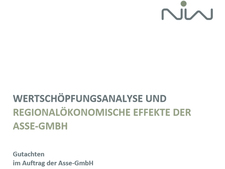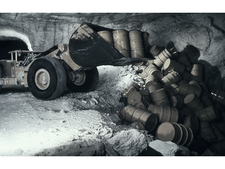"No positive aspects" associated with the Asse topic?
On the debate about the "value" of a ramshackle facility
- As had been expected, the economic report on the working place effects in the Asse project has triggered a public debate.
- The BfS promotes an open and transparent dialogue.
- That includes considering all sides and not keeping any aspects secret.
As had been expected, the economic report on the working place effects in the Asse project has triggered a public debate. Together with the Asse-GmbH the Federal Office for Radiation Protection (BfS) presented the report to the public on 28 January 2016.
Economists have investigated how the annual expenses currently amounting to over 100 million euros affect the economy. The experts estimate that in the year 2014 alone, investments maintained over 1,700 jobs across Germany.
Expert report (in German) (Download)
However, there were "no positive aspects" to be derived; everyone should keep such interpretations of the ramshackle situation to themselves, a reader then wrote in the local press. That would mean "glossing things over", another reader opined. At this point the BfS picks up on the debate.
Undisputed: Mistakes of the past
Hardly any picture has left a greater impression on people's perception in the context of radioactive waste disposal than the photo of a bucket wheel excavator dumping drums over a heap inside the mine. The excavator has become the symbol of an irresponsible handling of radioactive wastes in the Asse mine.
The mistakes of the past have been and still are debated again and again. Between 2009 and 2013, an inquiry board of the Lower Saxon Landtag dealt with the past. To be able to comply with the protection goals anchored in law, the only remaining option according to present knowledge is the recovery of the wastes.
As the current operator, the BfS has been tasked with the safe closure without being the one who caused the environmental problem.
One picture, two perspectives
However, the picture of the bucket wheel excavator has also contributed to distort perception of the problem in part. When asked today how they estimate the risk potential of the Asse mine, people will give a wide range of answers that only rarely coincide with reality.
In relation to the inventory of a CASTOR cask, the radioactive inventory of the Asse mine corresponds to a two-hundredth. The purpose of this statement is not to play down the possible risk to the environment.
Unrealistic images of disaster do not help master the challenges involved in the recovery of the wastes, however, on the contrary: According to experiences made by the BfS, they may lead to increased protection thinking that would delay the procedure rather than speeding it up.
An open dialogue must also include positive aspects
The BfS promotes an open and transparent dialogue. That includes considering all sides and not keeping any aspects secret. That the Asse project also shows very positive perspectives for a structurally weak area, has been shown most recently in the economic report.
However, and the BfS as the responsible operator of the facility also promotes this aspect: It cannot be taken for granted that the Parliament grants millions of euros year by year in the long term. And spending is more often granted if it is not considered a burden but also a profitable investment into safety and economy.
For many people in the region it remains unsatisfying that the tax payers alone and not the waste producers may pay for the immense remediation costs.



